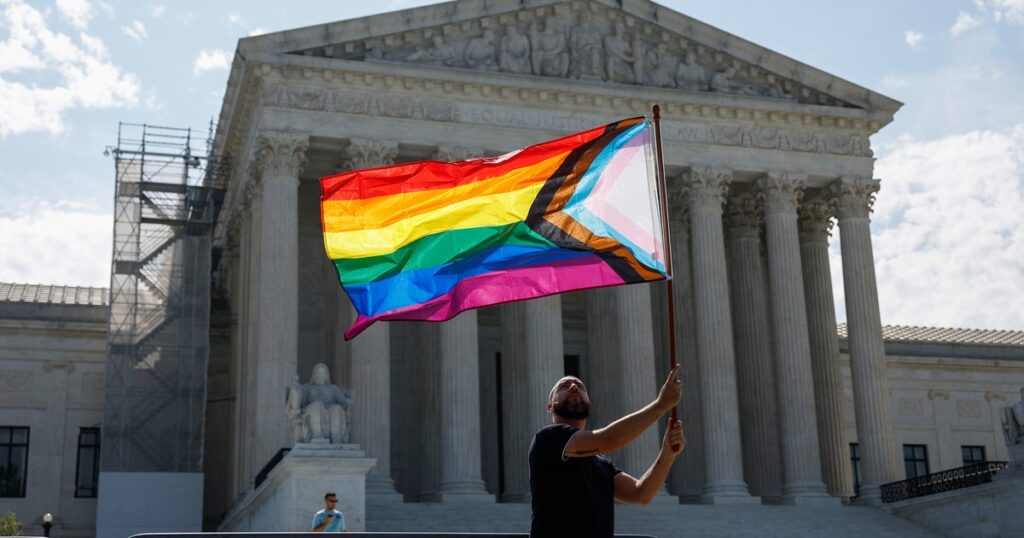The Trump administration has taken aim at certain groups of people with many of its cruel policies, but one of the hardest hit — from the campaign trail up until now — are trans folks.
The latest attack comes in the form of the cutting of a lifesaving service: the defunding of the LGBTQ+ youth suicide hotline, a free nationwide hotline that can be reached by calling 988 and selecting option 3.
In just a few weeks, on July 17, option 3 will no longer exist — although the 988 lifeline itself will still be available to the general public (and LGBTQ+ youth can call the general number, but the level of care won’t be the same).
There are specific programs within 988 that offer specialized services to groups with the highest risk of suicidality, said Mark Henson, the vice president of advocacy and government affairs at The Trevor Project, which is how the LGBTQ+ youth option came to be.
“So, if one engages 988 and presses one, you’re routed to the veterans crisis line, because our nation’s veterans have significantly higher rates of suicidality than the civilian population because of what they’ve experienced,” Henson said.
(It’s worth noting that the veterans crisis line is not going anywhere in July — defunding only applies to the LGBTQ+ hotline).
“And if you press three, you’re routed to an LGBTQ+ youth-specialized counselor who has training and experience speaking the language that LGBTQ+ youth use, in understanding these drivers of suicidality and life experiences, and are therefore more equipped to provide these clinically best practice services and to help LGBTQ+ youth get through the day and live a better tomorrow,” Henson noted.
Since the start of the LGBTQ+ youth suicide hotline in 2022, it has received calls from 1.3 million LGBTQ+ youth, according to Henson.
“And demand is rising — for the last five months that we have data, there’s been an average of 60,000 LGBTQ+ youth per month who have accessed this line across the country,” Henson added.
“… At the end of the day, the issue isn’t that these kids are queer and trans. The issue is that they are queer and trans in environments that are hostile.”
– Jasper Liem
Demand also reached a high after the election in November, said Jasper Liem, the executive director of the Attic Youth Center in Philadelphia.
“I think it’s really important for folks to understand what is really happening with this defunding,” said Liem. Until July 17, individuals can still call the 988 hotline and receive automated voice prompts that direct them to an option for services for LGBTQ+ youth, which then connects them with a trained professional, Liem explained.
“And the funding that is being cut is the funding that paid for those hotline callers and for their training and to the organizations who were basically administering that whole thing,” Liem noted. This includes The Trevor Project.
“Forty one percent of trans and gender non-conforming youth seriously considered suicide in the past year,” Liem said. Through many attacks on gender-affirming care, the government is actively taking away medical care from trans and queer youth, Liem noted.
“We’re seeing the government taking away the funding and the access to one of the few ways that we know we can support trans and queer youth, which is providing them with medical care that’s appropriate,” Liem added.
“You’re taking away their ability to transition and live whole lives, which is going to increase their mental health concerns. It’s going to exacerbate their symptoms. Because, at the end of the day, the issue isn’t that these kids are queer and trans. The issue is that they are queer and trans in environments that are hostile,” Liem said.
Meaning, the need for mental health support within this community will only increase.
Where LGBTQ+ youth can go for support instead
In the absence of 988 option 3 come mid-July, there are still numbers LGBTQ+ youth can call or text for support as well as organizations online and in-person they can turn to:
- Blackline: A peer support line for BIPOC people that can be reached at 1-800-604-5841
-
Centerlink: “At a more like local level there, there’s a way to look up LGBTQ youth organizations [using] Centerlink,” said Annie Berkness, the executive director of ALSO Youth in Florida. Centerlink self-describes as “the community of LGBTQ Centers” and offers an online state-by-state database of LGBTQ+ youth organizations.
-
The Trevor Project: You can call a Trevor Project crisis counselor at 1-866-488-7386, text “start” to 678-678 or start an online chat.
-
THRIVE Lifeline: A trans-led support hotline via text message that can be reached at 1-313-662-8209.
-
Trans Lifeline: The Trans Lifeline is a support hotline for trans people that can be reached at 877-565-8860.
Experts say, though, that there will likely be an influx of people calling (so, be aware of potential wait times) once the 988 LGBTQ+ youth suicide hotline goes offline in July.
Folks can still call 988, but once again, they might not be met with the same level of understanding.
Having an affirming adult in their life is key.
Research shows that having a trusted adult to turn to is lifesaving for young people who are struggling with their mental health and having thoughts of self-harm, said Liem.
According to Henson, the presence of one affirming adult can reduce the risk of suicide by 40%.
“When I was doing clinical work, I did this with families all the time where a young person might be really struggling, and I’d say, ‘OK, how about we come up with a code word,’ so I had one person who was super lactose intolerant, so we knew that if this kiddo went to their uncle and said, ‘I really would love to go get some pizza and ice cream,’ that was the code for pick me up right now, we need to go to a hospital,” said Liem.
Having a safety plan in place with accessible language is crucial, Liem explained.
“Because it’s hard to say, ‘Hey, I need help.’ It’s hard for adults to say, ‘Hey, I need help,’ but if you have this agreement with somebody in your life that says, ’Hey, if I send you this code word or I send you this text, this is what our plan is, you’ve just lowered the barrier to actually making use of that plan, and that could save your life,” Liem noted.
It’s also important to create a supportive and affirming environment for the LGBTQ+ youth in your life, Liem added. For example, simply using their name and pronouns drops their risk of suicide, he noted.
You can also show you’re a safe person by wearing things like Pride pins or buttons, said Berkness.
Here’s what you can do to fight back.
The LGBTQ+ youth suicide hotline had bipartisan support and has been funded through both Democratic and Republican congresses, said Henson.
“I’d say it’s understandable that people have disagreements about policy. It’s also understandable that people have disagreements about some aspects of LGBTQ policy, but this program is about saving people’s lives, and Republicans, independents, Democrats that I know can all come together and agree it’s important that we help youth live a better tomorrow,” Henson said.
The Trevor Project is fighting along with “a coalition of mental health advocates, veterans advocates and people all across the country to stop these cuts,” noted Henson.
“So, what we’re doing is … we’ve launched a national petition, available at thetrevorproject.org/actnow that calls on Congress and the administration to continue the bipartisan funding for this and to not let these services end,” Henson noted.
People can also post their support for The Trevor Project on social media, Henson said.
You can also consider donating, Berkness noted.
“The loss of funding for the Trevor Project is creating a need for the Trevor Project. If they’re not going to get it from this administration cutting it off, they are still trying to raise money so that they can keep this lifeline going,” she said.
Showing support to the organizations doing work to support LGBTQ+ youth and the LGBTQ+ community as a whole is one way to push back against the Trump administration, while also reminding LGBTQ+ folks, and especially trans folks, that they’re important and seen during a decidedly hard time.
When Liem was asked what he would say to those who are struggling, he said, “Even in the hardest of times, we are a movement that has seen hard times before — and that they’re not alone.”
If you or someone you know needs help, call or text 988 or chat 988lifeline.org for mental health support. Additionally, you can find local mental health and crisis resources at dontcallthepolice.com. Outside of the U.S., please visit the International Association for Suicide Prevention.
Read the full article here








